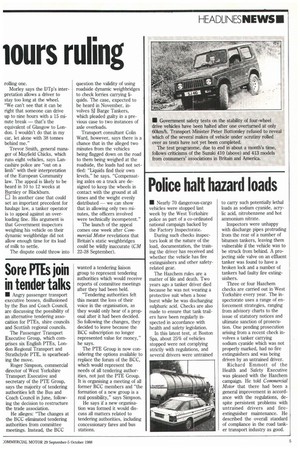Police halt hazard loads
Page 5

If you've noticed an error in this article please click here to report it so we can fix it.
• Nearly 70 dangerous-cargo vehicles were stopped last week by the West Yorkshire police as part of a co-ordinated national campaign backed by the Factory Inspectorate.
During such checks inspectors look at the nature of the load, documentation, the training the driver has received and whether the vehicle has fire extinguishers and other safetyrelated gear.
The Hazchem rules are a matter of life and death. Two years ago a tanker driver died because he was not wearing a protective suit when a hose burst while he was discharging sulphuric acid. Checks are also made to ensure that tank trailers have been regularly inspected in accordance with health and safety legislation.
In this latest test, at Boston Spa, about 25% of vehicles stopped were not complying strictly with regulations, and several drivers were untrained to carry such potentially lethal loads as sodium cyanide, acrylic acid, nitrobenzene and hot ammonium nitrate.
Inspectors were unhappy with discharge pipes protruding from the rear of a number of bitumen tankers, leaving them vulnerable if the vehicle was to be struck from behind. A projecting side valve on an effluent tanker was found to have a broken lock and a number of tankers had faulty fire extinguishers.
Three or four Hazchem checks are carried out in West Yorkshire every year. The inspectorate uses a range of enforcement strategies, ranging from advisory charts to the issue of statutory notices and ultimate sanction of prosecution. One pending prosecution arising from a recent check involves a tanker carrying sodium cyanide which was not properly marked, had no fire extinguishers and was being driven by an untrained driver.
Richard Emmott of the Health and Safety Executive was pleased with the Hazchem campaign. He told Commercial Motor that there had been a general improvement in accordance with the regulations, despite persistent problems with untrained drivers and fireextinguisher maintenance. He described the overall standard of compliance in the road tanker transport industry as good.
















































